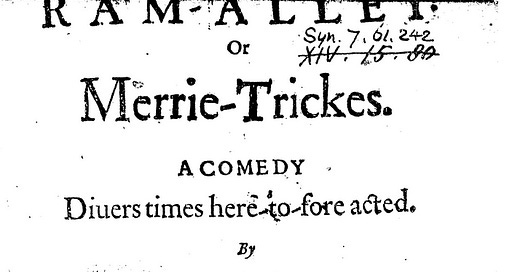William Shakespeare was one of many playwrights, all jostling for position and commercial success; and he, of course, inspired dozens of playwrights who came after him. John Fletcher (who often worked with Francis Beaumont) took over from Shakespeare as the lead playwright of the King’s Men, and the two collaborated together on Two Noble Kinsmen (which, to my mind, contains some of Will’s best poetry.)
One of the playwrights around at the time was a fascinating figure called Lording Barry. Born in 1580, he was the son of a successful fishmonger (who had his own coat of arms), and went up to Cambridge, where he received an MA. He seems to have been a bit of a swaggering rogue; and he certainly ended up in a place that not many playwrights have ended up before. I can certainly imagine him as a roisterer and a doisterer, sauntering up the alleys with his sword to hand.
In 1607 he, alongside the poet Michael Drayton (and others), set up the Children of the King’s Revels, who occupied the Whitefriars Theatre, and whose performers included Nathan Field and William Barksted (whom I’ve written about here.)
They put on plays by Beaumont and Fletcher, by Marston, Chapman and Ben Jonson; and also, by Nathan Field. They also performed a play by Barry, his sole surviving one: Ram Alley, or Merrie Tricks (1608), a city comedy, set around Whitefriars. It concerns a chap called William Smale-shankes, and his father, Sir Oliver Smale-shankes. William is in love with the widow Taffata; Constantia is in love with Boucher; unsurprisingly, the lovers finish having been properly paired off. He’s also supposed to have had a hand in a Middleton play, The Family of Love.
Ram Alley is interesting as an example of its genre: it’s not wildly original, but it has its moments, and it’s worth reading for the pungent vocabulary and sense of London life alone. There are punks and letcheries aplenty.
Barry, however, didn’t stick around on the theatre scene for long. The plague, and King James, closed the theatres, and Barry was thrown into debtor’s prison; from where he escaped, and, like a character from romance, ran away to sea. Yes, he became a pirate.
Strangely, his escapades as a pirate - which included capturing and robbing ships - don’t seem to have had many repercussions, and he ended up joining Sir Walter Raleigh on a trip to Guiana.
Sadly, when he returned, he doesn’t seem to have felt the need to write any more plays: which is a terrible shame. He lived, quite happily trading, until his death in 1629.
Lording Barry’s life is a fascinating one: and it also helps to set William Shakespeare into context, for here was someone also trying to make money out of the theatre; although in this case, failing. It’s an interesting counter-factual to imagine Will’s playing company failing: would he, too, have fled to the seas? Or would he have returned to Stratford and taken up gloving?
I’ve surmised that William Barksted knew Shakespeare; since Lording Barry had clearly known Barksted, once more it isn’t hard to see a connection between Barry and Shakespeare. He was in the same milieu, too, as Edmund Shakespeare the player, and I wonder if he caught up with his old mates Middleton, Marston and Fletcher.
And so, perhaps, Barry regaled old Will with a few tales of piracy over a pie and a mug of foaming ale.




